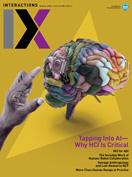Authors:
Madhu Reddy, Lena Mamykina, Andrea Grimes
Health information technology (HIT) has the enormous potential to transform healthcare by positively affecting quality, efficiency, and cost-effectiveness. However, despite ongoing efforts by many government agencies, HIT continues to experience low levels of adoption [1]. Moreover, a growing body of research questions its impact on medical care [2], for example, by highlighting the unintended consequences of HIT [3] and medical errors that result from poorly designed computing systems [4]. Researchers argue that many of these negative consequences result from a mismatch between the reality of conducting clinical work and the structure of computing applications that are meant to support…
You must be a member of SIGCHI, a subscriber to ACM's Digital Library, or an interactions subscriber to read the full text of this article.
GET ACCESS
Join ACM SIGCHIIn addition to all of the professional benefits of being a SIGCHI member, members get full access to interactions online content and receive the print version of the magazine bimonthly.
Subscribe to the ACM Digital Library
Get access to all interactions content online and the entire archive of ACM publications dating back to 1954. (Please check with your institution to see if it already has a subscription.)
Subscribe to interactions
Get full access to interactions online content and receive the print version of the magazine bimonthly.







Post Comment
No Comments Found